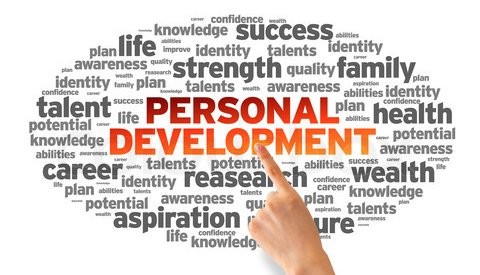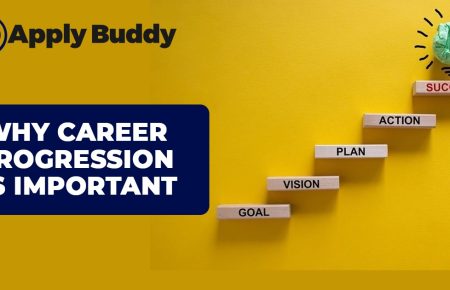Do you know you can abuse career progression even though you need it? This is because you’ve not asked why career progression is important. Career progression is crucial for personal and professional growth. It involves moving forward in your career through promotions, acquiring new skills, and taking on more significant responsibilities.
This upward movement enhances your career and contributes to your overall satisfaction and motivation at work. Understanding why career progression is important can help you align your goals and efforts towards achieving them.
Progressing in your career means more than just climbing the corporate ladder. It reflects your ability to adapt, learn, and excel in different roles and responsibilities. When you focus on career progression, you set a path for continuous improvement and long-term success.
This journey can increase job satisfaction, as you’re more likely to feel valued and recognised for your contributions. Additionally, it can open doors to new opportunities and experiences that enrich your professional life.
Also Read: How to Talk About Your Skills in an Interview
Understanding Career Progression

Career progression involves a series of steps or milestones over time. It’s a dynamic process that requires a strategic approach and continuous effort. Unlike a linear career path, career progression can take various forms, such as lateral moves, skill development, and leadership roles. This multifaceted nature makes it accessible to everyone, regardless of their starting point.
Setting clear goals and developing a roadmap is important to navigate your career progression effectively. This includes identifying your strengths and areas for improvement, seeking feedback, and being open to new challenges.
By doing so, you can build a solid foundation for growth and make informed decisions that align with your long-term career aspirations. Embracing the concept of career progression empowers you to take control of your professional journey and achieve your desired outcomes.
See Also: How to Craft a Compelling Cover Letter That Shows Your Passion
Differences Between Career Advancement and Career Progression
While career advancement and career progression are often used interchangeably, they have distinct meanings. Career advancement typically refers to moving up the ranks within an organisation, such as getting a promotion or a raise.
It’s a more vertical movement that usually signifies a step up in title, responsibilities, and salary. Career progression, on the other hand, encompasses a broader scope, including lateral moves, skill enhancement, and personal development.
Understanding these differences is crucial in setting realistic career goals. Career progression involves upward and lateral moves, focusing on personal growth and skill acquisition. Career advancement is a part of this journey but is not the sole indicator of success.
By recognising the distinction, you can adopt a holistic approach to your career, seeking opportunities for growth in various directions, not just upward movement.
Also Read: The 30-60-90 Day Plan: Your Secret Weapon for New Job
Benefits of Career Progression
Career progression is a very important plan to venture in as it has numerous benefits. The benefits range from increasing your job satisfaction to financial increase and stability and enhancing your professional skills and expertise.
- Increased Job Satisfaction and Motivation: One of the significant benefits of career progression is the boost in job satisfaction and motivation. As you advance in your career and take on new challenges, you will likely feel engaged and fulfilled in your work. This sense of accomplishment and recognition can drive you to perform better and stay committed to your professional goals.
- Higher Earning Potential and Financial Stability: Career progression often leads to higher earning potential and greater financial stability. You become more valuable to your organisation as you develop new skills and take on more responsibilities. This increased value can translate into better compensation and benefits, providing the financial security to achieve your personal and professional aspirations.
- Enhanced Professional Skills and Expertise: You can enhance your professional skills and expertise through career progression. Whether through formal education, on-the-job training, or mentorship, each step forward helps you become more proficient and knowledgeable in your field. This continuous learning process is vital for staying relevant and competitive in today’s fast-paced job market.
- Greater Job Security and Career Stability: Career progression can also lead to greater job security and stability. By continuously improving your skills and gaining experience, you make yourself indispensable to your employer. This reduces the risk of job loss and positions you as a key asset within your organisation, providing security and stability in your career.
How Career Progression Impacts Personal Development
Career progression does not only affect your finance and job satisfaction, it also has a lot to do with impacting your personal development. The following ways are examples of how it can impact your personal development.

- Growth in Confidence and Leadership Abilities: Career progression significantly impacts personal development, particularly regarding confidence and leadership abilities. As you take on more challenging roles and responsibilities, you develop a stronger sense of self-assurance and the capability to lead others. This growth in confidence can positively influence all areas of your life, enhancing your overall personal and professional well-being.
- Development of New Skills and Competencies: Another critical aspect of personal development through career progression is acquiring new skills and competencies. By continually learning and adapting, you become more proficient in your current role and prepare for future opportunities. This ongoing development ensures you remain competitive and can navigate the ever-changing job market.
- Expanded Professional Network and Opportunities: Career progression often leads to an expanded professional network and increased opportunities. As you grow in your career, you meet new people, build relationships, and access resources to help you achieve your goals. This network can provide support, guidance, and opportunities for collaboration, further enhancing your professional journey.
Strategies for Achieving Career Progression
Achieving career progression is not a child’s play. It involves you putting all the effort and dedication into the work while ensuring it doesn’t affect your health or other life areas. To avoid making career progression at the expense of losing other important things in your life, there are strategies and principles to put in place.

- Setting Career Goals and Creating a Plan: To achieve career progression, it’s important to set clear career goals and create a plan to reach them. Start by identifying your goals in your short-term and long-term career. Then, develop a roadmap that outlines the steps you need to take to achieve these goals. This plan should be flexible and adaptable, allowing you to adjust your strategy as needed.
- Seeking Mentorship and Networking Opportunities: Mentorship and networking are vital to career progression. Seek mentors who can provide guidance, support, and valuable insights based on their experiences. Additionally, use networking opportunities to connect with professionals in your field. Building a solid network can open doors to new possibilities and provide a support system as you progress in your career.
- Pursuing Additional Education and Certifications: Pursuing additional education and certifications is another effective strategy for career progression. Continuous learning helps you stay current with industry trends and advancements, making you more competitive in the job market. Consider enrolling in courses, attending workshops, or obtaining certifications relevant to your field. This commitment to lifelong learning demonstrates your dedication to personal and professional growth.
Challenges to Career Progression
There are hurdles to cross and mountains to climb to engage in the career progression journey. The challenges sometimes can look little but can limit your progression. While some seem so hard, with dedication, you can overcome them.
- Limited Opportunities Within the Organisation: One of the main challenges to career progression is the limited opportunities for advancement within your current organisation. If the company has a flat structure or limited positions available, it can be challenging to move up the career ladder. Lack of Support from Management: Career progression often requires support from management through mentorship, career development programs, and opportunities for advancement. Without this support, it can be challenging to progress in your career.
- Personal Barriers: Personal barriers, such as fear of failure, lack of confidence, or poor time management skills, can hinder career progression. Overcoming these personal challenges is important for achieving your career goals.
- Skills Gap: A skills gap occurs when there is a difference between your skills and skills needed for the next level in your career. Addressing this gap through education and training is crucial for career progression.
- Workplace Bias and Discrimination: Workplace bias and discrimination can pose significant challenges to career progression. This can include biases based on gender, race, age, or other factors, limiting opportunities for certain individuals.
- Economic and Industry Changes: Economic downturns or changes in the industry can impact career progression by reducing job opportunities and increasing competition. Staying adaptable and continuously updating your skills can help mitigate these challenges.
- Work-Life Balance: Maintaining a healthy work-life balance while pursuing career progression can be challenging. Striking the right balance between professional and personal responsibilities is key to sustainable career growth.
Strategies for Overcoming These Challenges
To overcome challenges to career progression, start by seeking new opportunities within and outside your organisation. Build a strong professional network by connecting with mentors and peers and attending industry events to gain insights and support.
Address personal barriers such as fear of failure or lack of confidence through self-reflection, professional development courses, and feedback from trusted colleagues.
Continuous learning and skill enhancement are crucial for overcoming career progression challenges. Identify and bridge skills gaps through education and practical experience. Stay adaptable by keeping up with industry trends and being open to new technologies.
Balancing professional and personal life is also important for sustainable growth. By implementing these strategies, you can effectively navigate obstacles and achieve your career goals.
Conclusion
In conclusion, career progression is vital to professional and personal development. It offers numerous benefits, including increased job satisfaction, higher earning potential, enhanced skills, and greater job security.
Understanding the importance of career progression and implementing effective strategies can help you achieve your career goals and enjoy a fulfilling professional journey.
For personalised guidance and support in your career progression, consider using ApplyBuddy. ApplyBuddy provides expert advice, resources, and tools to help you navigate your career path and overcome challenges.
Whether setting career goals, seeking mentorship, or pursuing additional education, ApplyBuddy is your trusted partner in achieving your professional aspirations. Start your journey with ApplyBuddy today and take the next step toward a successful and rewarding career.

Frequently Asked Questions
What are some effective ways to set career progression goals?
Effective ways to set career progression goals include identifying your long-term aspirations, breaking them down into achievable milestones, and creating a detailed action plan. Regularly review and adjust your goals as needed.
How can you identify opportunities for career advancement?
You can identify opportunities for career advancement by staying informed about industry trends, seeking feedback from mentors, and actively looking for new challenges within and outside your current organisation.
What role does networking play in career progression?
Networking is crucial in career progression by providing access to new opportunities, resources, and support. Building a strong professional network can help you gain insights, find mentors, and open doors to career advancement.
How can you overcome common obstacles to career progression?
Overcoming common obstacles to career progression involves being proactive, seeking out new opportunities, and continuously developing your skills. Building a strong support network and staying adaptable can help you navigate challenges effectively.





